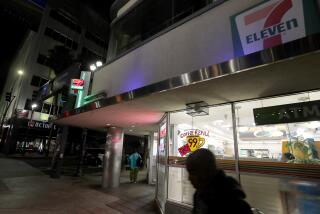Task Force on Liquor Stores Is Unveiled : Businesses: Mayor forms group to try to reduce tensions over rebuilding of outlets in South Los Angeles. Korean-American merchants and some residents have been at odds.
- Share via
In an attempt to reduce tensions between merchants who lost their South Los Angeles liquor stores in the riots and community residents who do not want the stores rebuilt, Mayor Tom Bradley on Monday formed a liquor store task force.
“We have a unique opportunity to explore new ways of reducing the number of liquor outlets and still recognize the rights of people who own such stores,” Bradley said, as he named a dozen task force members, including community residents, ministers, grocers and Korean-American merchants.
About 728 liquor stores are licensed to operate in South Los Angeles, according to the state Department of Alcoholic Beverage Control. An estimated 400 of the stores were damaged or destroyed during the riots.
The heavy concentration of outlets--along with the loitering and drug and gang activities that liquor stores attract--has created a “constant stream of complaints” from residents, Bradley said.
At a news conference in front of a burned-out liquor store at 46th Street and Avalon Boulevard before a tour of several riot-damaged areas of the city, Bradley said the new task force “will explore a variety of ways of dealing with the problem, perhaps by the purchase of existing liquor licenses, perhaps by retraining people to get them to do different businesses.”
African-American attorney Mary Lee, co-chairwoman of the task force, said she hopes that the panel will “look at mechanisms to involve residents of this community who have been locked out of the economic processes.”
The issue is a sensitive one for Korean-American merchants, who, by some estimates, owned at least half the damaged or destroyed stores. They oppose a city ordinance, passed after the riots, which streamlines the application and permit process for some businesses planning to rebuild--but not for liquor stores, which are subject to a lengthy public review process. Some merchants have filed a lawsuit against the new law, claiming discrimination.
Jin Lee, a task force member and leader of the Assn. of Korean American Victims of L.A. Riot, said liquor store owners may be willing to relocate if properly compensated.
“As long as we don’t lose any money, maybe we’ll be glad to move out,” said Lee, whose Compton liquor store and market was destroyed. “Who wants to go back unless they’re crazy? The reason we’d have to is because that’s where our assets are, that’s all we have.”
Co-chairman T.S. Chung, a Korean-American attorney, said the community and the victimized merchants have “competing goals” and noted: “The business owners have the right to rebuild if they so desire.”
The task force will report to the mayor in 90 days. Bradley stressed that any recommendations it makes will be voluntary because liquor store owners have the legal right to rebuild.
Manuel Espinoza, ABC deputy director, said the state does not have the authority to revoke licenses because of a concentration of liquor stores in one area. Neither can the ABC prevent license transfers to new owners, he added, unless a law is violated. Most South Los Angeles licenses were in place at the time of the 1965 Watts riots, he said. “All they’ve done is change hands.”
But owners can take their licenses, sold for an estimated $25,000 to $30,000, and move to other locations within Los Angles County, Espinoza said. And there are indications that some store owners are doing just that.
Several victims have made inquiries about relocating to the Westside of Los Angeles or the San Fernando Valley, and a few have applied to do so, Espinoza said.
More to Read
Sign up for Essential California
The most important California stories and recommendations in your inbox every morning.
You may occasionally receive promotional content from the Los Angeles Times.










